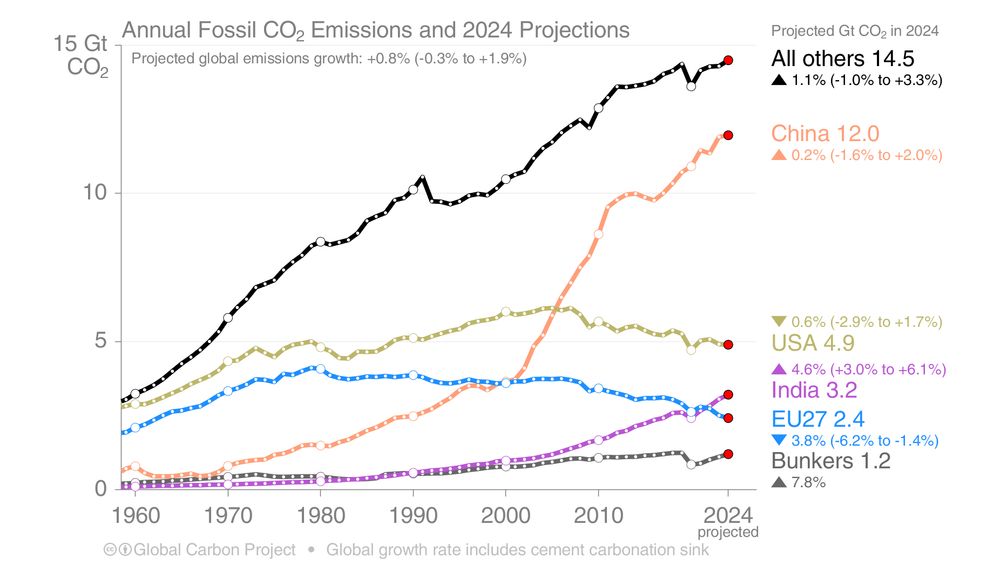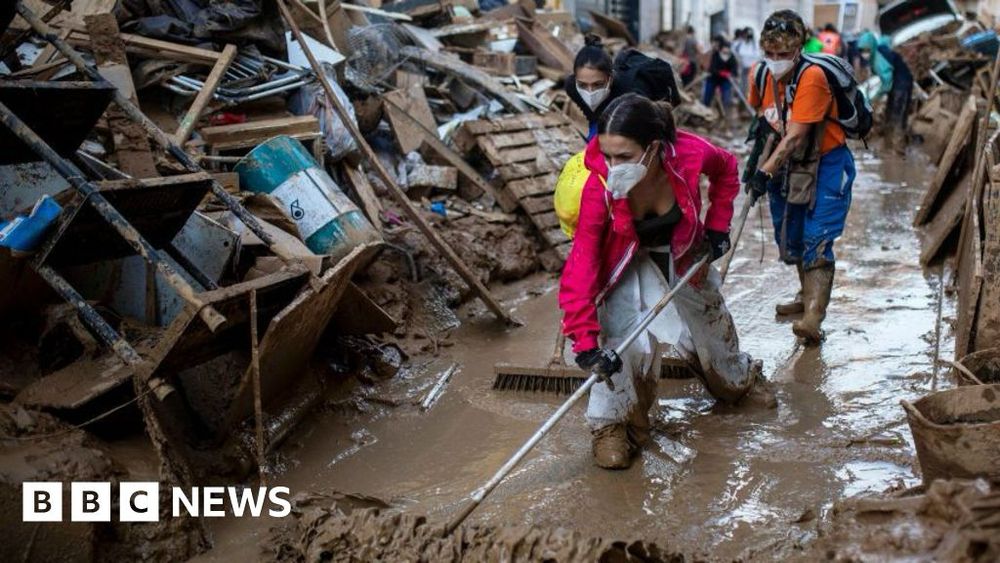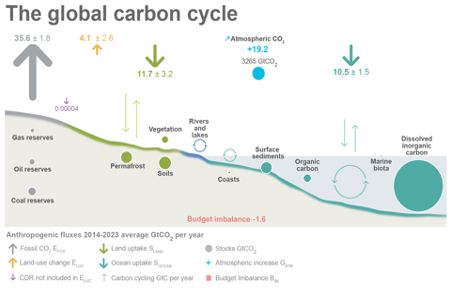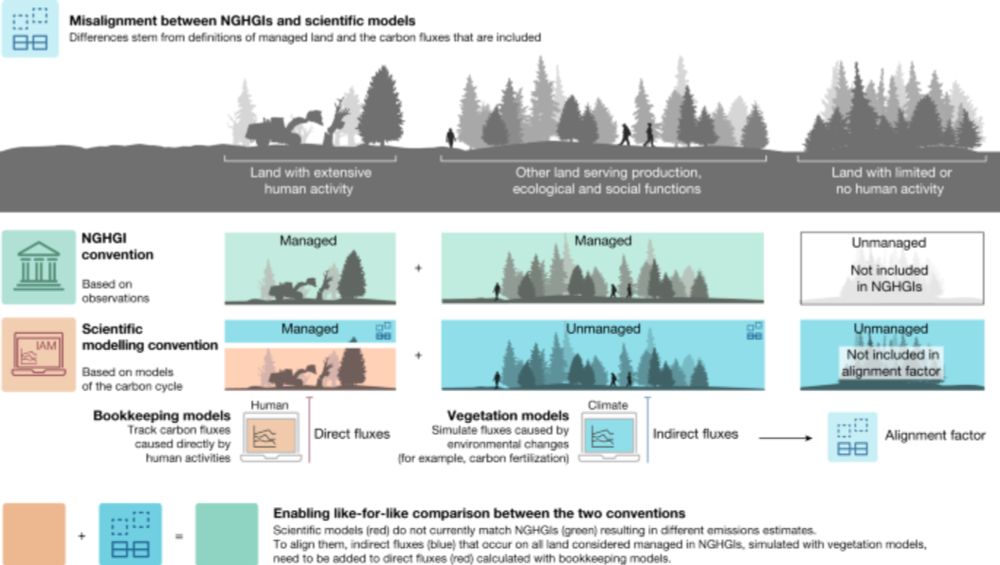Session CL4.13
Abstract submission is now open for EGU25. We would love to get submissions for our session on TCRE and ZEC: meetingorganizer.copernicus.org/EGU25/sessio...
Deadline 15 Jan.
Work presented can contribute to the WCRP assessment – see www.wcrp-climate.org/slc-events-o...
18.11.2024 14:31 — 👍 7 🔁 4 💬 0 📌 2

Why are CO2 emissions still going up? What are the key factors behind the increase, & when will they peak and start heading down?
Wednesday 20 Nov 830-930, in person (Oslo) & streamed
Register @ciceroclimate.bsky.social: www.linkedin.com/feed/update/...
18.11.2024 09:03 — 👍 66 🔁 24 💬 3 📌 2
fair comment - and of course "climate" (i.e. local conditions, extremes etc) doesn't necessarily stabilise just because global T does.
I think the bigger issue is not just the definitions, but the concept of offsetting fossil emissions by ecosystem removals. Simply not sustainable in the long run
16.11.2024 19:18 — 👍 2 🔁 0 💬 1 📌 0
Watch out next week for a new paper calling for more clarity in what we mean and how progress is reported.
Ultimately “natural” sinks and land-based managed sinks can only offset so much from fossil fuels. Any sustainable “net zero” must mean “geological net zero”
leave it in the ground!
16.11.2024 18:34 — 👍 1 🔁 0 💬 1 📌 0
So what does all this mean? Neither is wrong – they just differ. But it does tee up a mismatch of target setting and monitoring prorgess
Essentially scientists say “we need net zero”, countries say “we’ve got plans to meet net zero”. But different definitions mean they don’t meet in the middle.
16.11.2024 18:34 — 👍 2 🔁 0 💬 1 📌 0
But the definition of emissions used by UNFCCC reporting splits “human” and “natural” by _location_. Anything which happens on managed land can be classed as a removal. This means that some of the natural carbon sink is attributed to human activity leading to an overestimate of our removals.
16.11.2024 18:34 — 👍 1 🔁 0 💬 1 📌 0
The definition used by IPCC ARs splits “human” and “natural” by _process_. In this case human removals can include planting forests. But NOT the response of existing forests to elevated CO2. Such a response is classed as natural
It is by this definition that net zero leads to stopping warming…
16.11.2024 18:34 — 👍 0 🔁 0 💬 1 📌 0
The confusion is how we treat the behaviour of the land carbon sink on land classed as “managed”.
Does stuff here count as “natural” or “anthropogenic”? Different conventions say both yes and no to this - which leads to different measures of human emissions
16.11.2024 18:34 — 👍 0 🔁 0 💬 1 📌 0
“net zero” sounds easy – remove as much as we emit. Then global warming stops right?
A thread on how, sadly, it turns out there are differing definitions of “anthropogenic” and hence of net zero. This means we might think we’ve done what’s required to halt warming, but actually we don’t.
16.11.2024 18:34 — 👍 11 🔁 1 💬 1 📌 0

COP29: UN climate talks 'no longer fit for purpose' say experts
Call for change comes after host country Azerbaijan's president calls oil and gas a 'gift of God'
‘At the last COP, fossil fuel lobbyists outnumbered representatives of scientific institutions, Indigenous communities and vulnerable nations’ C Figueres (ex UN) . We don’t have time for this corrupt and inept fiasco - we are being failed www.bbc.com/news/article...
15.11.2024 07:29 — 👍 1722 🔁 407 💬 32 📌 9

The global carbon budget 2024 is out
13.11.2024 07:03 — 👍 357 🔁 191 💬 12 📌 16
my first bluesky mention :-) cool paper Ben!
15.11.2024 13:47 — 👍 2 🔁 0 💬 0 📌 0
Bicycle user, Climate scientist, European. Working on climate monitoring and datasets in Devon, GB. He/him
Climate scientist at Concordia in Montreal, co-creator of climateclock.net, Director of sustainabilitydigitalage.org and member of Canada's Net-Zero Advisory Body. Interested in carbon budgets, nature-based solutions, and many other things
Climate researcher, Professor of Atmospheric Physics
@oxfordphysics.bsky.social
Director @intelligentearth.bsky.social
Physics of the Ocean and climate science. Earth System Modelling. Based in the UK.
.
.
Since 2024 I am 95% out of action because I have Long Covid.
.
.
long covid
missing even the years
of unhappy work
.
.
(Poem by gomp: @gompart.bsky.social)
Climate scientist and communicator, following accounts for info and engagement on all aspects of greenhouse gas science and policy
The UK's Earth system model provides robust science knowledge in support of UK & international climate actions.
https://ukesm.ac.uk/
Investment pro here for
• climate science, economics, solutions, policy, investment, impacts
• energy transition
• economics
Big on domain experts/expertise, abundance, potential.
*V* anti- fake experts, poseurs, snark, *esp.* climate-related.
Earth Scientist. Director Royal Netherlands Institute for Sea Research. Latest book “CO₂ through the ages”. Oxf. Univ. Press.
Climate scientist. Professor in SEOS at UVic; Former MLA for Oak Bay-Gordon Head. AndrewJWeaver.ca
Canadian Climate Scientist from Nova Scotia, specializing in Zero Emissions Commitment, carbon budgets, permafrost carbon, and biogeochemical feedbacks to climate change.
Lecturer in Earth Observation at University of Leicester and UKRI Future Leaders Fellow. Interested in climate, carbon cycle, methane, wetlands, remote sensing, machine learning.
Mathematician turned climate scientist researching tipping points at the University of Exeter
Climate Researcher at NILU and NTNU | IPCC WG I and III AR6
Lecturer in atmospheric chemistry at the University of Bristol (🧪).
Oceans. Climate. Society. And everything in between. Climate scientist and numerical modeler, aka Anastasia Romanou. NASA-GISS/Columbia U. Views my own.
Climate scientist. She/her.
Senior Research Fellow in Climate Change and Health, University of Bristol.
Honorary Consultant at UKHSA (2022-2024).
IPCC AR6 contributing author.
Professor of Climate Science | University of Bristol | Joint Met Office Chair | Alan Turing Fellow | Leading the UK Climate Change Risk Assessment on Health and Wellbeing | IPCC AR6 | extreme weather & impacts
Climate scientist at University of Bristol, most interested in present/future extreme climatic event risk and improving our prediction models, including with AI. https://www.climatebristol.org/people/peter-watson/
Ocean & Climate scientist. Lead author @IPCC_CH AR6. Chercheur au CNRS, Paris
Prof. in Climate Change at the University of Exeter. Head of Department of Maths & Stats. Field Chief Editor of Frontiers in Climate. https://experts.exeter.ac.uk/4409-mat-collins



